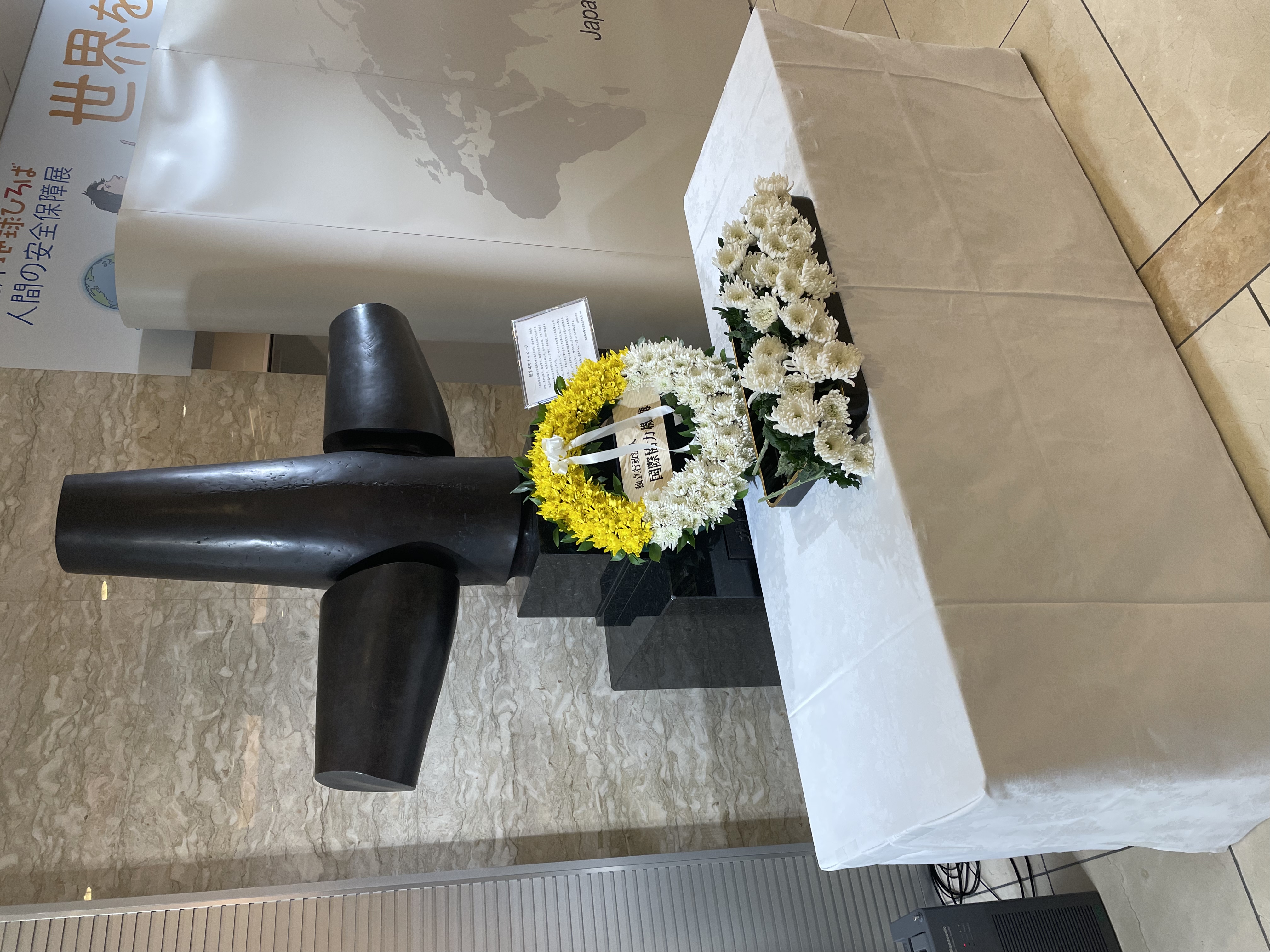Security first
2023.06.26
-

- Maruo Shin Planning Division Security Management Department
This year, another July is approaching.
I am saying this because July is the month when two major fatal incidents took place. Coincidentally, both happened in July that involved people working for JICA projects. Everyone working for JICA should never forget.
Both incidents were terrorist attacks. One of the incidents happened thirty-two years ago that killed three experts in Huaral, Peru. The other one took place seven years ago when seven consultants were killed in Dhaka, Bangladesh.
These are not the only cases in which people involved in JICA projects have unfortunately lost their precious lives. These people died with their aspirations unaccomplished: due to illness, traffic accidents, robberies, airplane accidents, etc. It is important to face this reality and take to heart the pledge to never repeat such cases again.
In response to the terrorist attack in Dhaka seven years ago, the Japanese government has established the Council on Safety Measures for International Cooperation Projects. Based on the outcome of its final report, JICA released a “JICA Declaration on Security Measures” in November 2017 in the name of then President Kitaoka Shinichi. Following this in October 2022, JICA renewed the “JICA Declaration on Security Measures” under the name of the new President Tanaka Akihiko who took over the former president in April of the same year. The declaration highlights "Highest Priority to Human Life," "Optimal Security Measures," and "Sense of Ownership on Security Measures.”

Monument for International Cooperation "Toward a Better Future Together"
To comfort the souls of JICA’s friends and colleagues who devoted their precious lives, a monument was erected in October 1993 at the Training Institute for International Cooperation (now the Sadako Ogata Institute for Peace and Development).
JICA projects are mainly undertaken in the fields of developing countries. Given the dire situations of the people in needs of the developing countries, one should not forget that the work may entail risks, so we must be prepared.
As the “JICA Declaration on Security Measures” states, to give the "Highest Priority to Human Life,” we need to reduce risks to an acceptable level. This said, it is very difficult to strike the balance between this principle and carrying out our work.
Let me share my own experience. I worked at an overseas office in an African country until this February. There, I was often bothered by the difficulty of balancing the two factors. Furthermore, ensuring all the people involved in our projects the security awareness was even harder.
During my four years at the office, I wasn’t accident-free; several incidents and accidents occurred including those in a neighboring country over which I had the jurisdiction. Although some cases were unpreventable, investigation result showed that obvious carelessness were the causes in some cases. As the Heinrich's Law, a rule of thumb for occupational accidents, states that behind every major accident, there are 29 minor accidents, and behind every minor accident, there are 300 abnormalities. This means that a minor incident could lead to a major one if left unaddressed.
In the field of international cooperation, the rate of personnel encountering crimes is relatively low immediately after their arrival in the destination. It is probably because they are extra cautious each day. It is when the personnel have got used to the living and drop their guard, they become prone to encounter crimes or traffic accidents.
Among those who have been involved in JICA projects, many are highly experienced in working in the fields in developing countries. Of them, many are perhaps fortunate enough to have no experience in dangerous situations. Nevertheless, even if they were OK yesterday, it doesn’t mean there’re guaranteed to have another danger-free day today.
JICA has taught in the various training opportunities that security management is built through self-help (at the individual level), mutual help (at the organizational level), and public assistance (at the national level). However, JICA (the organization) is unable to fully control individual behavior even if it implements "Optimal Security Measures." It is essential for each individual to ensure security management through his or her own behavior. The bottom line is, practicing self-help based on “Sense of Ownership on Security Measures” is important.
To promote practicing self-help, it is vital to show practicable measures and present reachable goal that one can reach by working hard. The idealized norm has no meaning. What’s more, people gradually lose interest if they hear the same thing repeatedly. JICA needs to make all the efforts to get the security measure messages across to change behavior of the people involved with JICA projects.
The number of people engaging in JICA projects abroad, that dramatically decreased during the pandemic, is gradually returning to the pre-Covid-19 pandemic level. The number of dispatching JOCV members is also expected to return to the pre-Covid-19 level within the year 2024.
To secure the safety of some 25,000 people involved in the JICA projects (if the full deployment scale is resumed), it will hardly be achieved by depending on one particular department or personnel alone. Instead, the mutual help, that is to be supported by the entire organization, is important.
Encouraging each individual or organization, who are involved in the international cooperation projects, to be somewhat conscious about the security management. Such a little effort would build up and increase the security management capability as an entity. To raise the security awareness of each individual, we Security Management Department, as an overseer of the security management, will take necessary measures based on information gathered from various sources. Enhanced security awareness among each individual will improve the system for work in the fields to safely be carried out, enabling the people working for JICA projects can feel safe to fully engage in the development cooperation work in their fields. We reaffirm, we have the responsibility to realize this.
scroll